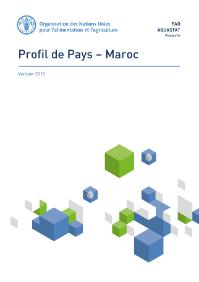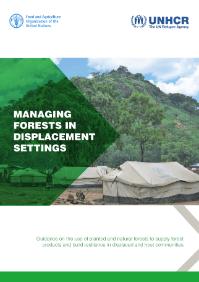Focal point
Location
The Food and Agriculture Organization of the United Nations leads international efforts to defeat hunger. Serving both developed and developing countries, FAO acts as a neutral forum where all nations meet as equals to negotiate agreements and debate policy. FAO is also a source of knowledge and information. We help developing countries and countries in transition modernize and improve agriculture, forestry and fisheries practices and ensure good nutrition for all. Since our founding in 1945, we have focused special attention on developing rural areas, home to 70 percent of the world's poor and hungry people.
Members:
Resources
Displaying 411 - 415 of 5074Profil de Pays – Maroc
Ce profil de pays décrit l’état des ressources en eau et l’utilisation de l’eau, ainsi que l’état de la gestion de l’eau agricole dans le Maroc. L’objectif de cette monographie est de décrire les particularités du pays et les problèmes rencontrés dans le développement des ressources en eau et de l’irrigation en particulier.
Fortaleciendo la Gobernabilidad del Agua en Unidades de Riego de Guatemala - TCP GUA 3504
El diagnóstico del uso del riego en Guatemala evidencia el poco aprovechamiento de la superficie diseñada por los regantes, por lo que los responsables de la gestión deben contribuir a la gobernanza del agua involucrando a las organizaciones de regantes y técnicos. El proyecto a través del fortalecimiento de capacidades para la gobernabilidad del agua está enfocado en el aumento y mejora del suministro de los bienes y servicios procedentes de la agricultura, de la actividad forestal y la pesca.
Jamaica and FAO
Jamaica joined FAO in 1963. In 1978, the Organization established a representation in Jamaica which today also covers
the Bahamas and Belize. Over the years, FAO has partnered with Jamaica to achieve sustainable agricultural and ruraldevelopment, mainly through the Organization’s Technical Cooperation Programme (TCP). Interventions have ranged frompolicy formulation to technical agricultural development and emergency assistance projects. Recent cooperation has placedManaging forests in displacement settings
The massive increase in demand for woodfuel for cooking caused by sudden influxes of refugees and other displaced people is usually the main driver of forest degradation and deforestation in displacement settings. It places enormous pressure on nearby forests and woodlands and is often a source of tension between the host and displaced communities. A lack of sufficient cooking fuel also has an impact on the nutrition and health of vulnerable people in such settings.
Managing forests in displacement settings
The massive increase in demand for woodfuel for cooking caused by sudden influxes of refugees and other displaced people is usually the main driver of forest degradation and deforestation in displacement settings. It places enormous pressure on nearby forests and woodlands and is often a source of tension between the host and displaced communities. A lack of sufficient cooking fuel also has an impact on the nutrition and health of vulnerable people in such settings.










